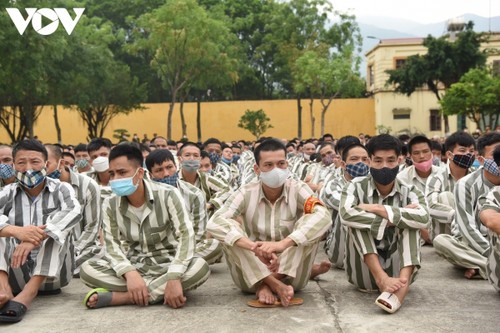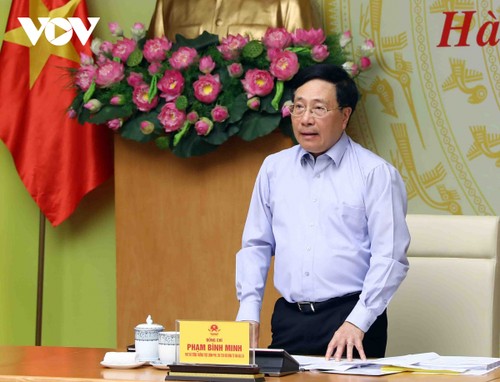 At the Vinh Quang prison in Vinh Phuc province (Photo: VOV) At the Vinh Quang prison in Vinh Phuc province (Photo: VOV) |
Ensuring strictness
The 2022 special amnesty once again reflects the Vietnamese Party and State’s leniency policy and Vietnam’s humane tradition of encouraging offenders to repent and become useful citizens.
Since the President signed the 2022 decision on special amnesty, relevant ministries, sectors, and the Special Amnesty Advisory Council have implemented timely procedures in line with the law.
More than 3,000 applications for amnesty are being examined and evaluated strictly, democratically, openly, and transparently. Thousands of people will be pardoned to return home, reunite with their families, and get ready to rebuild their lives. Those who once went astray had to pay the price for their violations of the law and had some civil rights restricted according to regulations. They are now being given a chance to correct their mistakes and enjoy full citizen rights and obligations. These are the reflection of Vietnam’s humane policy and its effort to ensure and promote human rights.
The 2022 Special Amnesty is the 9th amnesty since the National Assembly passed the 2009 Law on Amnesty. After 8 rounds of special amnesty, more than 90,000 people have been pardoned and have quickly reintegrated into the community. The rate of pardoned people re-violating the law is low.
Deputy Minister of Public Security Major General Nguyen Van Long said: "In 2021, we pardoned more than 3,000 prisoners. Of them, only 2 people violated the law again. The rest have reintegrated into the community. This year, the President allows continued amnesty to implement the leniency policy of the Party and State."
All inmates are equal
Vietnam's Law on Amnesty applies not only to Vietnamese inmates but also to foreigners. Chimechidike Ben of Nigeria has been in Vinh Quang prison, Vinh Phuc province, for nearly 13 years for selling and illegally transporting drugs. He is being considered for special amnesty this year and having his life sentence reduced to 30 years in prison.
He said: "At that time, I wanted to die as soon as possible because my future was uncertain. When I came to prison, I was helped by the prison staff and the Supervisory Board. I did not understand the laws of Vietnam and I did not know the punishment I would get for transporting those drugs. If I had known in advance, I wouldn't have done it. During my first days in prison, I was very sad, I blamed myself for not understanding so I had to pay a high price. When my sentence ends, I will become a volunteer to tell young people about avoiding drugs."
 Permanent Deputy Prime Minister Pham Binh Minh, Head of the Special Amnesty Advisory Council (Photo: VOV) Permanent Deputy Prime Minister Pham Binh Minh, Head of the Special Amnesty Advisory Council (Photo: VOV) |
Currently there are approximately 750 foreign inmates serving sentences in detention facilities in Vietnam. Inmates with a foreign nationality are treated the same as Vietnamese inmates and are also eligible for special amnesty.
At a meeting to review the list of prisoners being considered for amnesty, Permanent Deputy Prime Minister Pham Binh Minh, Chairman of the Advisory Council for the 2022 Special Amnesty, said: "One of our principles is to make sure that inmates who are eligible for special amnesty are considered in a transparent and strict manner. Relevant agencies need to review, comment on, and vote on the list of inmates before their the list is submitted to the President for approval."
Although the number of people pardoned in recent years is large, Vietnam’s political security, social order, and safety are still ensured and no complications caused by pardoned inmates have been reported. Most people who have been granted amnesty have returned home, stabilized their lives, and worked honestly. The amnesty demonstrates the tradition of kindness and tolerance of the Vietnamese people and the leniency policy of the Vietnamese State toward offenders. The amnesty work has contributed to the National Program on Crime Prevention and Control, and has been highly praised by the public.